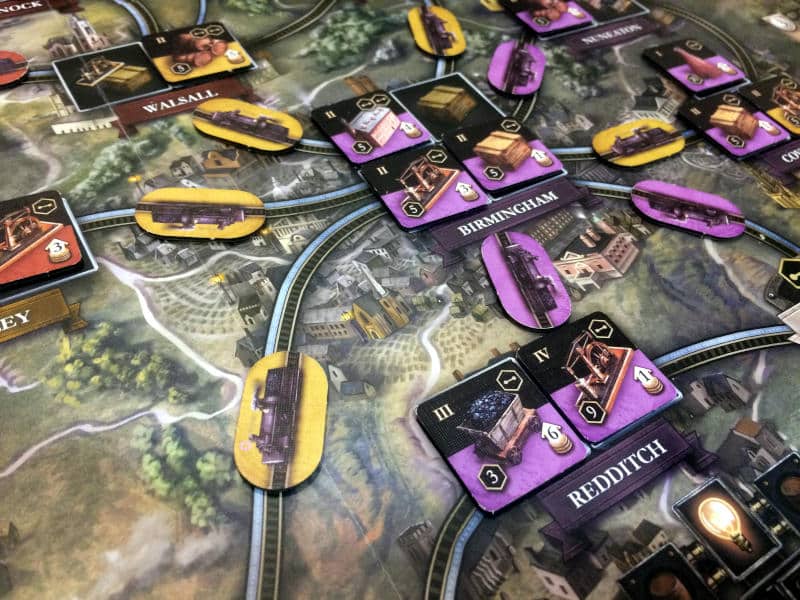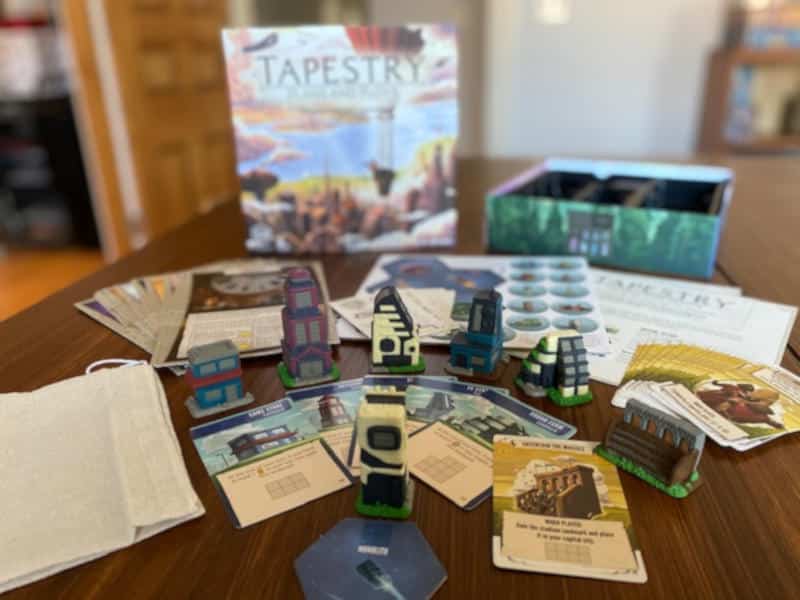We are all so very conditioned to play board games to the end. Most games have some sort of end game trigger and a form of end game scoring. They want us to play them all the way through. Yet, when a player’s win is all but guaranteed, continuing to the end seems pointless. The enjoyment of a game often matters more than strictly following the rules. Adapting play to the situation and the group’s mood can keep board gaming fun and engaging. I want to look at this in some more detail and explore why so many of us insist on playing to the very end.
Listen to the Audio Version
Intro Music: Bomber (Sting) by Riot (https://www.
Royalty Free Music: Bensound.com/royalty-free-music
License code: SZZLWUJHVBUPJ80V
Artist: : Vital
Music by Bensound
License code: ZBROHOHA7CPSHBMA
Artist: : The Fable
Music: Bensound.com/free-music-for-videos
License code: AFAL3NFGWYHRDT21
Artist: : Lunar Years
Attractive Endings
There is a natural appeal in finishing a game. Most modern board games set clear boundaries, whether that is a fixed number of rounds, a specific number of turns, or the triggering of an end game condition such as running out of cards. These structures help players pace their decisions, plan ahead, and evaluate their performance within a clearly defined framework. A pre-agreed ending also gives weight to choices made during a game, since everyone knows time is limited.
However, what seems like good reasons to play every game to its ultimate conclusion, there are times when a fixed game end can cause problems.
For example, in games with fixed rounds, the final turns often stretch well beyond their usual length. Everyone suddenly becomes overly obsessed with optimising their scores. After all, you only have a few more turns before a winner is decided. Players try to consider every possible outcome, every potential efficiency, and every scoring opportunity. What was a quick decision earlier in the game suddenly becomes an excruciatingly long exploration of all options.
In Brass: Birmingham, for example, deciding whether to build a rail link or upgrade an industry can change the trajectory of your network. While that’s hard to predict early in the game, near the end, it feels like you have a better overview and therefore need to consider your decisions more carefully.
Similarly, in Tapestry, every last resource in the fourth age can be squeezed for another advancement. Every decision suddenly feels momentous. While you should probably have made the most of your resources early on in the game, now the lack of one or two resources can feel devastating.
The irony is that fixed endings, while providing structure and satisfaction, can also make the closing stages drag out endlessly – and unnecessarily so.
Keeping the blog running takes time and resources. So if you can chip in, that would be amazing.

Overlong Play
If fixed endings can drag out the sometimes inevitable, long and open-ended games introduce their own burdens. For many players, nothing feels worse than realising hours before the end that victory is out of reach. Food Chain Magnate is an often-cited example. One poorly judged investment or early misstep can ruin the entire game for you. What follows is a slow decline, where the gap between players only widens, and the prospect of catching up grows more distant with every round.
In these situations, forcing players to finish the game feels like an endurance test. While the leaders battle it out in tense calculation, everyone else already knows they have lost. The experience shifts from active engagement to passive waiting, with players merely taking turns until the inevitable outcome is revealed. It might even lead to players taking actions that actively influence which of the two players in the lead ultimately wins.
Tapestry sort of plays on the idea of someone finishing early. Everyone will end their game at different times. It is possible that some players may be forced to sit through several turns of fine-tuned optimisation that no longer involve them. For those still playing, these final moves are essential, but for those finished, the waiting can feel like wasted time.
Having to wait for others has consequences for the group dynamic. While one person is immersed in maximising their final score, another may be scrolling through their phone or otherwise disengaging from the experience. Laughter and energy fade, conversation drifts, and the table no longer feels like one collective experience. When this happens, the purpose of playing together starts to weaken.
Completionism
Despite these challenges, many players still feel compelled to play until the official end. Psychologists have studied this instinct in what is known as the Ovsiankina Effect, which describes how incomplete tasks linger in the mind. Leaving something unfinished niggles away at our brain. Board games are no different. Leaving a game unfinished can feel unsatisfactory. Not playing to the end is like abandoning a book halfway through or turning off a film before it has reached the peak of its story arc. Even when the outcome is obvious, many people crave the satisfaction of closure.
That is why games like Tapestry sit in such an awkward middle ground. A player may have wrapped up their fourth age and effectively ended their story, yet they cannot truly close the book until others finish. They are left waiting, their sense of resolution delayed, while others continue to play. It is an unusual form of tension. While one group experiences completion, the other is still deeply involved in the process.
Some people find this thrilling, as the scores are unknown until the very last move is taken. Others find it frustrating, preferring the game to stop once the outcome feels inevitable. Neither response is wrong. Both spring from the same desire to see things finished properly, even if the interpretation of “properly” differs.
How you resolve this conflict with the people you play with is up to you. Some people will insist on finishing exactly as the rulebook intends, out of respect for the designer’s vision. Others choose to end early, satisfied that the likely winner is already decided. In either case, the goal is the same. Everyone wants to achieve some sort of closure, whether through strict adherence or through shared agreement.

Flexible Formats
The contrast becomes clearer when we look at games designed with flexibility in mind. Trick-taking games rarely prescribe how many rounds to play. While some games have it in their rules, it is often a common, socially accepted standard to play as many rounds as you like. A single hand can be enjoyed on its own, and the group can stop whenever they wish. The Crew, for example, has a number of scenarios, but you can play as many or as few of them as you like. You can even replay a scenario or skip some.
Similarly, party games often continue for as long as laughter and energy last. Many do have some form of scoring, but that is usually ignored entirely. These designs treat endings as optional, shaped by the players rather than the structure. Prey Another Day, for example, has a specific way of scoring each round and describes when someone has won, but ultimately, nobody really cares. It’s much more fun trying to second-guess what card someone might play next.
Not defining a specific end to a game means there is no need to wait for a final tally or endure half an hour of downtime. When the fun fades, the game can end without any guilt. Playing is no longer about completion, but about enjoyment.
Of course, your group can always house rule fixed endings that are prescribed by a rulebook. If everyone agrees, you can easily finish once the winner is clear, or you might just decide to play fewer rounds for the sake of keeping things fun and interesting. It’s your choice, and that choice can change as a game progresses. Your group’s decision doesn’t have to be final.
Priorities Matter
Ultimately, deciding whether to play to the very end or to stop early is about priorities. If the people you play with insist that a game needs to be played exactly as its rulebook dictates, including the end game trigger, then so be it. If your group doesn’t really care about who wins, but just wants to have fun, then that’s perfectly fine too. Of course, there are many options in between.
All approaches are equally valid and accept that different people want to play in different ways at different times. The important thing is that expectations are shared. No one should feel short-changed. The heart of playing board games has always been about the experience. The way a session ends can shape how it is remembered, but that does not mean every game must be played to its official conclusion. Sometimes, the better choice is to call it early, leaving players eager to return next time rather than dreading an extended ending. How and when you finish the game you play is up to you and your group.
The instinct to play until the very end is deeply ingrained, shaped by culture, psychology, and often game design. Yet board games are adaptable, and so are the people who play them. Sometimes the right choice is to continue until final scoring. At other times, ending early supports the enjoyment of the game. The most important measure of a session is not the points tallied, even though for competitive players that can be true, but the shared moments and experience. Understanding when to prioritise following the rulebook to the letter and when to be more flexible is an important skill in creating positive and lasting board gaming memories.
This blog is free for everyone, but if you'd like to support it, here are some options.
Useful Links
- Brass: Birmingham review: https://tabletopgamesblog.
com/ 2019/ 07/ 06/ brass-birmingham-saturday-review/ - Tapestry review: https://tabletopgamesblog.
com/ 2019/ 10/ 26/ tapestry-saturday-review/ - Ovsiankina Effect: https://en.
wikipedia. org/ wiki/ Ovsiankina_ effect - The Crew review: https://tabletopgamesblog.
com/ 2020/ 12/ 05/ the-crew-the-quest-for-planet-nine-saturday-review/ - Prey Another Day review: https://tabletopgamesblog.
com/ 2024/ 05/ 11/ prey-another-day-saturday-review/
2 Comments
What are you thoughts?
Add your thoughts on the topic to the form below and join the conversation.


It’s an intriguing question. I rarely recall ever voluntarily ending a boardgame early (other than some pressing real-world imperative interrupting the game). Yet, as a daily Magic:The Gathering player, anytime I am convinced I have no real chance of winning, I concede. Until now I never noticed the contradiction.
Thank you for your comment, Robert. I’m glad you liked the question my article poses. I’m glad you can see the contradiction. It’s really weird and I only recently made a point of checking with other players to make sure they’re happy to continue or at least offering to call the game early, if it feels they’re just not having fun.